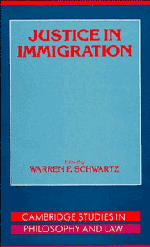Book contents
- Frontmatter
- Contents
- List of contributors
- 1 Immigration, welfare, and justice
- 2 Citizenship, the demands of justice, and the moral relevance of political borders
- 3 A two-country parable
- 4 Immigration, identity, and justice
- 5 Immigration, justice, and culture
- 6 Fear and loathing at the border
- 7 Immigration policy in liberal political theory
- 8 The welfare economics of immigration law: a theoretical survey with an analysis of U.S. policy
- 9 Just borders: normative economics and immigration law
- 10 Some caveats on the welfare economics of immigration law
- 11 The case for a liberal immigration policy
7 - Immigration policy in liberal political theory
Published online by Cambridge University Press: 18 March 2010
- Frontmatter
- Contents
- List of contributors
- 1 Immigration, welfare, and justice
- 2 Citizenship, the demands of justice, and the moral relevance of political borders
- 3 A two-country parable
- 4 Immigration, identity, and justice
- 5 Immigration, justice, and culture
- 6 Fear and loathing at the border
- 7 Immigration policy in liberal political theory
- 8 The welfare economics of immigration law: a theoretical survey with an analysis of U.S. policy
- 9 Just borders: normative economics and immigration law
- 10 Some caveats on the welfare economics of immigration law
- 11 The case for a liberal immigration policy
Summary
May a liberal state have a relatively restrictive immigration policy? How could we go about answering that question?
In writing of “immigration policy,” I refer to policies that restrict access to certain benefits to people who are geographically “connected” to the liberal state's territory. The benefits I will discuss are (a) the material resources that the state controls, either because those resources are physically located in the state or because the state has taken control over them through its tax policies, and (b) participation in the political processes that constitute the liberal state. Relatively restrictive immigration policies deny access to state-controlled physical resources to many people who are geographically connected to the state. They also, and perhaps independently, may deny access to participation in some liberal political processes.
We could try to determine whether liberal states may, consistent with their liberalism, adopt restrictive immigration policies either by examining the practices of states that all agree are sufficiently liberal or by attempting to figure out what liberal political principles imply about access to material resources and political participation. The first approach might be called the survey, the second the principled, approach. The survey approach identifies actual practices of liberal states and attempts to infer justifications for those practices that make the practices consistent with liberal political theory. So, for example, it appears that few liberal states impose significant restrictions on the rights resident aliens have to free speech, while many do restrict access to the right to vote. This might suggest that voting is connected to membership in a liberal political community in a way that free expression is not.
- Type
- Chapter
- Information
- Justice in Immigration , pp. 147 - 157Publisher: Cambridge University PressPrint publication year: 1995
- 2
- Cited by



